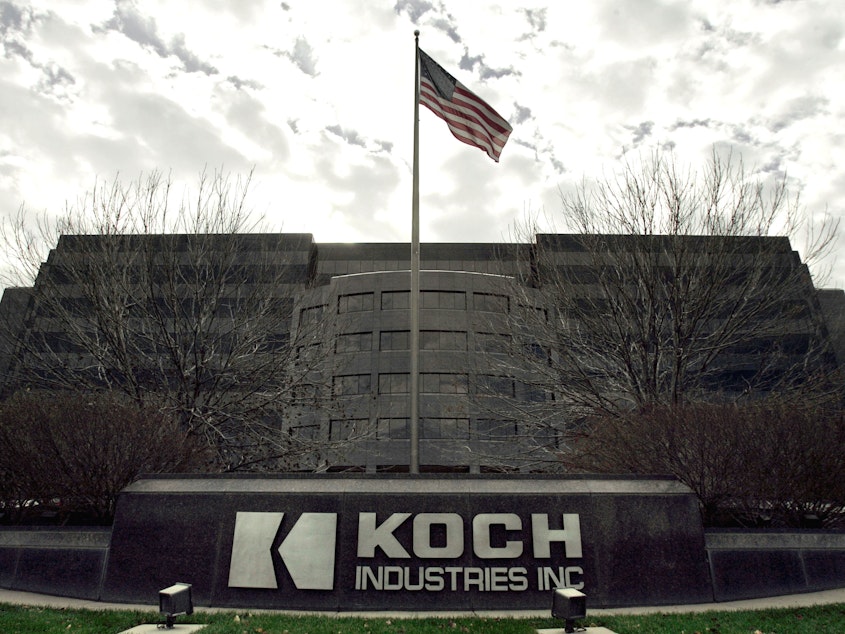'Kochland' Explores How The Famous Brother Duo Made Their Money

The Koch brothers are a ripe target: political plutocrats who have spent hundreds of millions of dollars in a decades-long effort to reshape the country and the Republican Party.
Updated at 10:45 a.m. ET
They've used their vast wealth to build a hydra-headed network of think tanks, lobbying shops, and "astroturf" advocacy groups to advance a philosophy that conveniently overlaps with the economic interests of their Wichita-based corporation.
None of this is exactly a secret, though. Jane Mayer's 2010 New Yorker article and subsequent book shined a bright spotlight on how the Kochs and other wealthy patrons use their Dark Money to wield outsize influence on American politics.
What Kochland, the new book from Christopher Leonard, adds to the story is not so much an account of the ways in which the brothers spend their money, but rather, a richly reported tale of how they make it — the inner workings of one of the nation's largest private corporations.
Sponsored
To be sure, the Koch brothers aren't entirely self-made. They got a sizable head start from their father. Fred Koch, a co-founder of the far-right John Birch Society, assembled his own mini-empire of ranches, factories and oil pipelines. But Charles and David Koch supersized this fortune. They added a Minnesota refinery that was well-positioned to turn cheap, Canadian crude oil into pricey gasoline for the fuel-thirsty Midwest. Over time, they expanded into fertilizer, paper products, options trading and even greeting cards.
The Kochs make big bets, and they have the patience to wait for results. (They play the long game in politics, too.) Koch Industries "thought on a timeline of ten or twenty years, not twelve to eighteen months. And, unlike virtually any other private equity firm, Koch's group only had two shareholders to answer to: Charles and David Koch." (David Koch retired from the business and public advocacy in 2018. Two other brothers, Bill and Fred, were bought out in 1983.)
Leonard quotes an employee of a Georgia Pacific pulp mill, Wesley Jones, who was stunned when the Kochs greenlighted a $40 million investment after a single phone call. "I remember putting the phone down and thinking, Damn ..."
After seven years of research, Leonard is able to tell this story with an insider's vantage point. We hear from refinery operators, warehouse workers, options traders and whistleblowers.
The prose is occasionally over the top. Do we really need to know about the white marble slabs between urinals in the men's room of a Senate office building? But for the most part, this is fast-paced business history. An episode about ammonia runoff at an oil refinery keeps you turning pages like a John Grisham thriller.
Sponsored
Koch Industries has some parallels with Enron, but without the flash. The company's low-key employees often come from state schools in the middle of the country. They don't pretend to be the smartest guys in the room, just the most disciplined.
The Kochs successfully leverage the insight and experience gained in one industry to get a leg up in others. They aren't always successful. A big push into agriculture and animal feed in the 1990s ended in disaster. But many of their moves pay off, sometimes lavishly. The Kochs were among the first to roll the dice on the shale oil boom, spending hundreds of millions of dollars on speculative pipelines from south Texas to their refinery in Corpus Christi.
"This investment was entirely a gamble," Leonard writes. The Kochs could have been left with useless pipelines to dry wells. "Then the oil started to flow."
For Leonard, the rise of Koch Industries is a refined example of forces shaping the wider economy, with growing returns for corporate shareholders — in this case just two — and shrinking bargaining power for workers. Charles Koch's philosophy of Market Based Management supposedly empowers workers to act as mini-entrepreneurs. But there's little evidence of that among the Georgia Pacific warehouse workers, whose autonomy is steadily stripped away in the name of greater efficiency.
Leonard pays due attention to the tortured dynamics of the Koch family: Charles and David's bitter feud with their brother Bill, and the looming question of who will take control when Charles eventually steps aside.
Sponsored
The legal battles with Bill spilled into a series of fines and criminal investigations in the 1980s and '90s. Koch "developed a regulatory rap sheet that gave the company a reputation for borderline criminality." Ultimately, Charles and David decided that was counterproductive and declared the company would comply with 100 percent of the rules, 100 percent of the time.
Of course, Koch's political arm was simultaneously working to water down or eliminate those rules — a push that has been richly rewarded in the Trump administration.
A company that prizes information has been a central player in efforts to spread disinformation about climate science. "This wasn't accidental," Leonard writes. "As early as 1991, Charles Koch and other executives in the fossil fuel industry helped foster skepticism about the evidence of climate change."
Even ExxonMobil eventually abandoned this strategy, acknowledging the scientific consensus. But the Koch political machine continue to fight any effort to limit carbon pollution, using the considerable resources that a $120 billion fortune can buy. [Copyright 2019 NPR]



